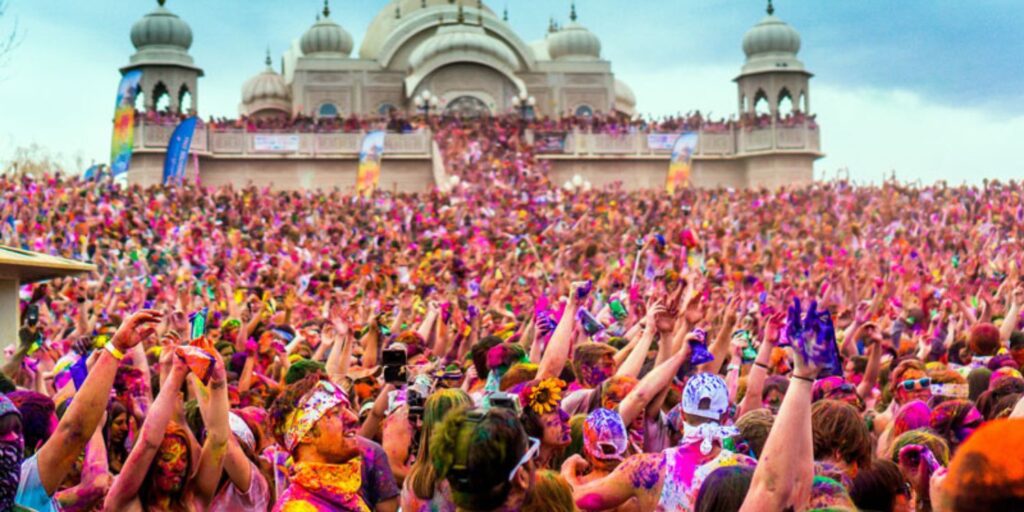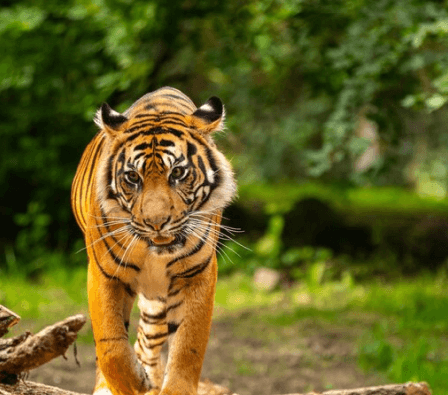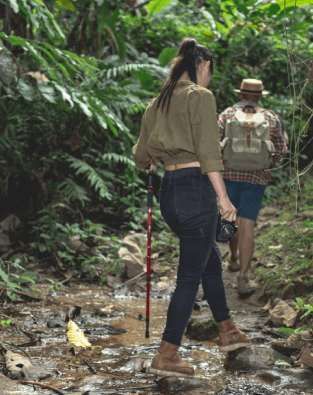Amidst the Himalayas, festivals in Jammu & Kashmir showcase its vibrant culture, adding to the region’s allure.
Enriched with diverse traditions and age-old customs, the festivals in Jammu & Kashmir celebrate life, spirituality, and communal harmony.
From Lohri’s grandeur to Eid-ul-Fitr’s spiritual hunger, the region embraces many festivities throughout the year.
The festivals in Jammu & Kashmir offer a fascinating glimpse into the area’s rich heritage, where colorful rituals, traditional music, and sumptuous feasts mark each celebration.
Whether it’s the exuberant dance performances during Baisakhi or the serene atmosphere of Shivratri, every festival holds a special significance for the locals, fostering a sense of unity and camaraderie among communities.
Amidst the snow-capped peaks and fantastic valleys, the festivals in Jammu & Kashmir are a vibrant expression of the region’s cultural mosaic, inviting visitors to partake in the joyous revelry and witness the timeless traditions that define this enchanting land.
1. Ziarats
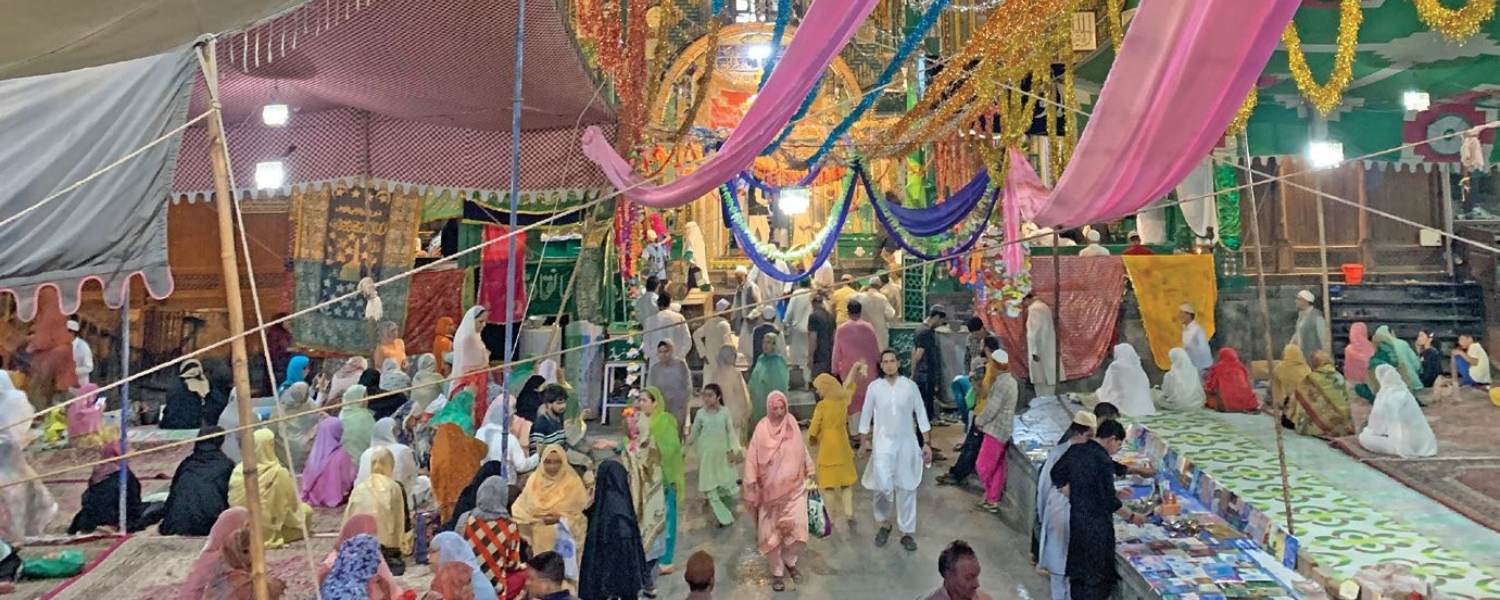
Festivals in Jammu & Kashmir are not just celebrations but vibrant showcases of communal harmony and cultural diversity.
Among these, the Urs, or Ziarats, hold a significant place, observed from January 8th to 21st.
This festival transcends religious boundaries, drawing participation from Muslims, Hindus, and Sikhs alike. It serves as a symbol of unity and mutual respect among the different communities in the region.
During the Urs, devotees gather at shrines and offer prayers, seeking blessings and divine favor.
The atmosphere is filled with spiritual enthusiasm, accompanied by traditional music and devotional songs.
It is a time for reflection, gratitude, and renewal of faith. The festival also provides an opportunity for socializing and strengthening bonds within the community.
The Urs exemplifies the rich cultural tapestry of festivals in Jammu & Kashmir, where diversity is embraced and celebrated.
Its inclusive nature fosters understanding and tolerance, making it a cherished event for people of all backgrounds.
2. Eid ul Azha and Eid ul Fitr
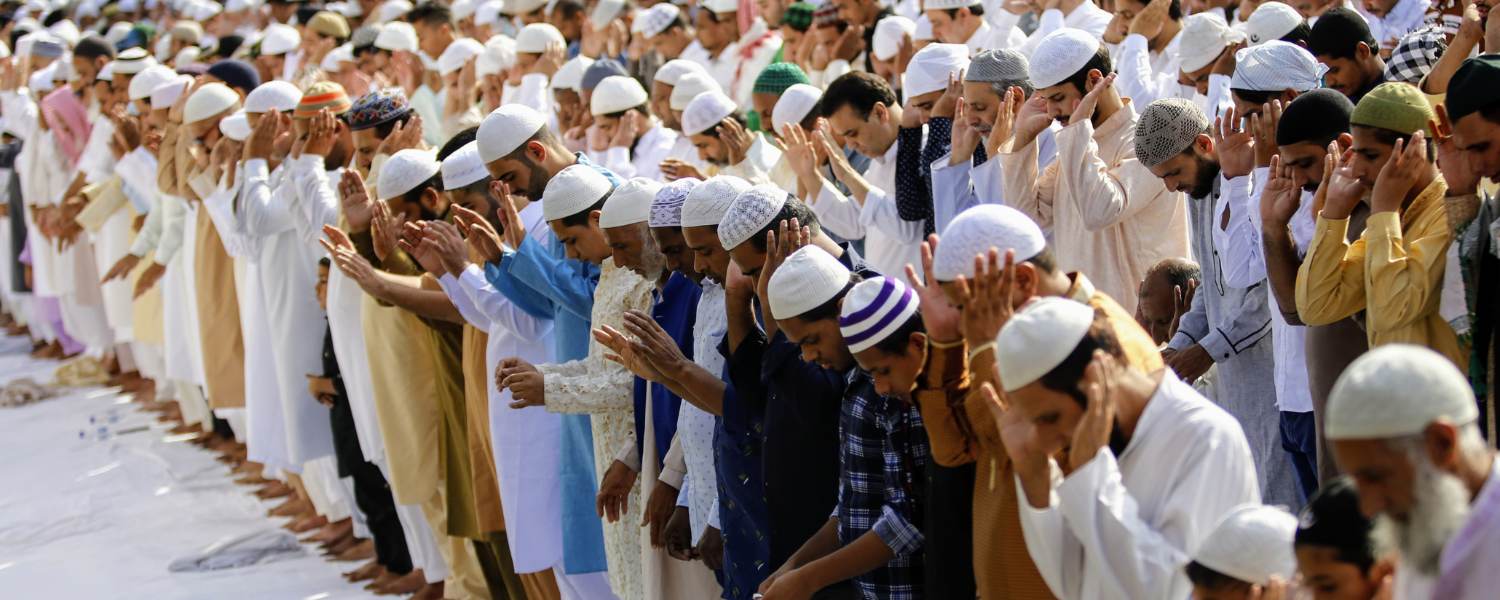
Discover the rich tapestry of Islamic culture and tradition through the vibrant festivals of Eid ul-Fitr and Eid ul-Adha, celebrated with zeal in festivals in Jammu & Kashmir and across the globe.
Eid-ul-Fitr, observed on April 10th, 2024, joyously concludes the month-long fasting period of Ramadan, symbolizing spiritual renewal, gratitude, and community bonds.
On this auspicious day, families gather for prayers, exchange heartfelt greetings, and indulge in sumptuous feasts, embodying the essence of generosity and compassion.
Eid-ul-Adha, which occurred on June 17th, 2024, holds profound significance, commemorating Prophet Ibrahim’s unwavering faith and readiness to sacrifice.
Muslims worldwide honor his legacy by offering animals as an expression of devotion and gratitude to Allah.
In Jammu & Kashmir, these festivals unite communities, fostering harmony and understanding among diverse cultural backgrounds.
Understanding the distinctions between Eid-ul-Fitr and Eid-ul-Adha enriches the cultural fabric and spiritual depth of these cherished celebrations, echoing the values of empathy, sacrifice, and unity cherished by Muslims globally.
3. Hemis Festival
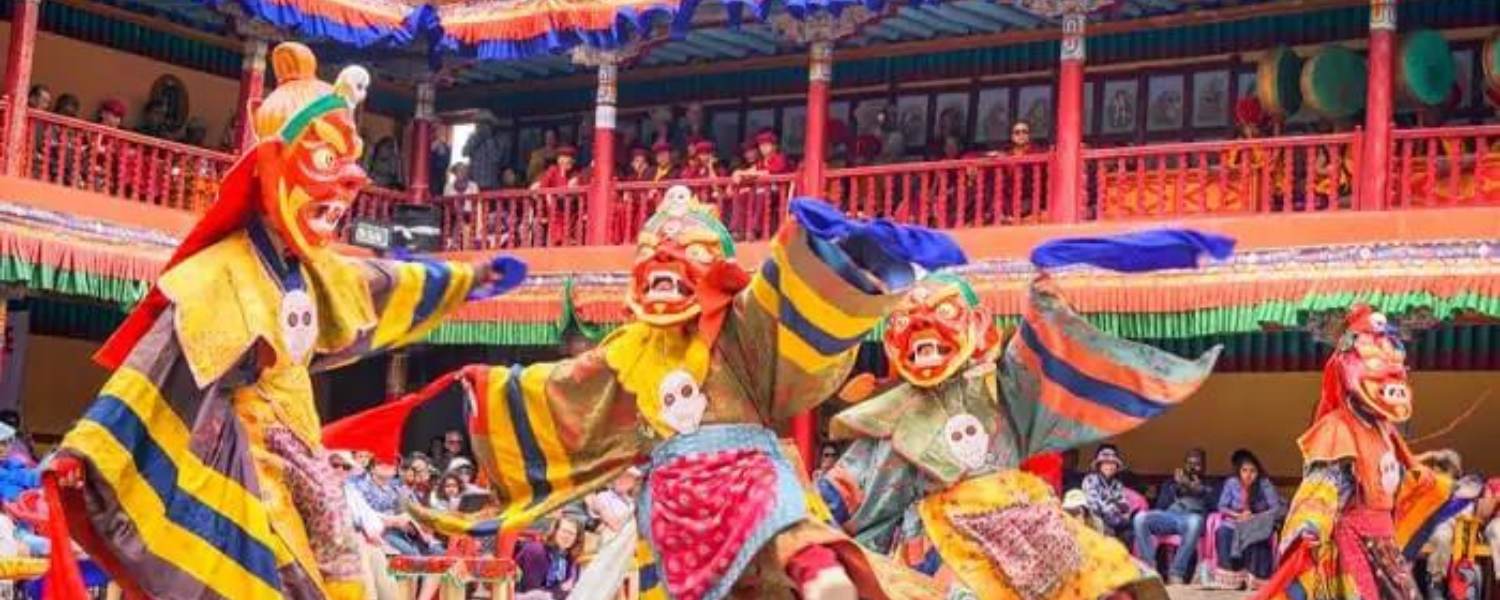
Discover the vibrant cultural tapestry of festivals in Jammu & Kashmir with the enchanting Hemis Festival, a celebration deeply rooted in Buddhist traditions.
Set to take place from June 16th to 17th, 2024, this annual extravaganza captivates visitors with its mesmerizing display of masked dances, songs, and rituals.
The Hemis Festival holds significant importance in Ladakh, where locals and tourists gather to revel in its splendor.
The festival’s highlight is the captivating masked dance performed by Lamas, adding a mystical allure to the event.
As the beats of traditional drums fill the air and colorful costumes swirl around, attendees immerse themselves in the region’s rich cultural heritage.
From intricate rituals to joyous festivities, the Hemis Festival offers a glimpse into the spiritual essence of festivals in Jammu & Kashmir.
4. Baisakhi
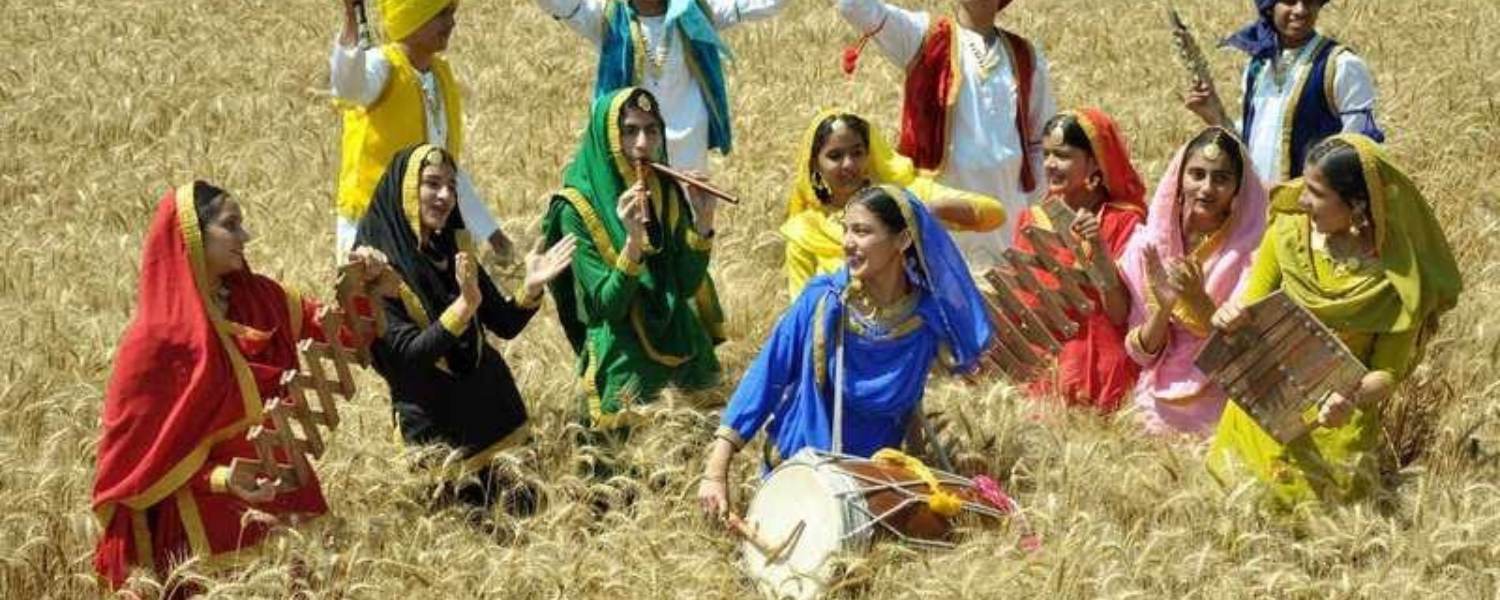
Baisakhi, also known as Vaisakhi or Basoa, is a vibrant festival celebrated annually on April 13th, with some observances extending to the 14th.
This auspicious occasion marks the onset of the Vaisakh month and is particularly significant in Punjab and Northern India.
Primarily a spring harvest festival, Baisakhi is a time for rejoicing and thanksgiving for the bountiful crops.
The festival holds profound cultural and religious importance, symbolizing unity and community.
In addition to its agricultural significance, Baisakhi also carries religious connotations, especially for the Sikh community; the Khalsa Panth’s establishment by Guru Gobind Singh in 1699 is commemorated on this day.
Festivals in Jammu & Kashmir reflect the region’s rich cultural tapestry, with Baisakhi celebrated equally enthusiastically among the people there.
Amidst the picturesque landscapes of Jammu & Kashmir, Baisakhi brings communities together, fostering a sense of solidarity and camaraderie as they partake in traditional dances, music, and feasts, making it a cherished occasion for all.
5. Tulip Festival
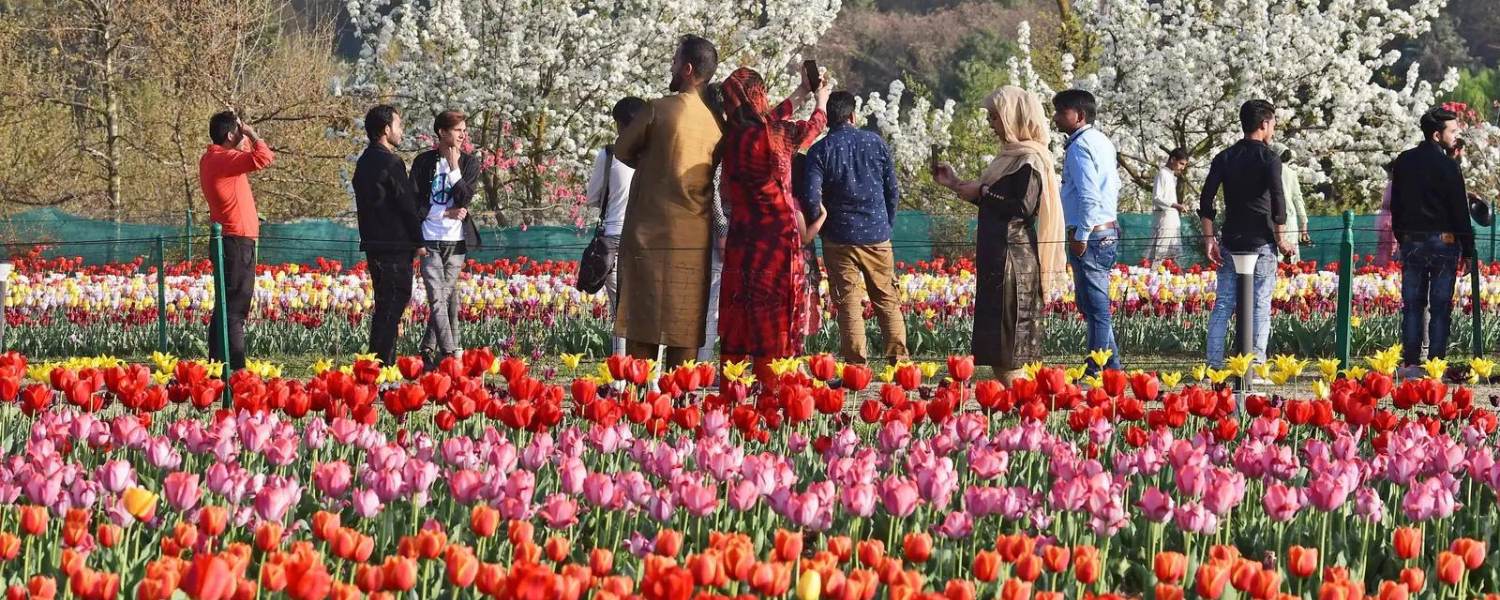
The Tulip Festival is a beloved event nestled amidst the breathtaking views of Jammu and Kashmir.
Set against the picturesque backdrop of the renowned Tulip Garden, this annual celebration promises a mesmerizing display of nature’s splendor.
Held on the 19th and 20th of April 2024, the festival marks the arrival of spring in the Kashmir valley.
Organized by the Government of Jammu and Kashmir as part of its tourism initiatives, the Tulip Festival aims to enchant visitors with the ethereal beauty of tulips in full bloom.
It’s a joyful occasion where locals and tourists gather to revel in the kaleidoscope of colors carpeting the gardens.
Experience the magic of this enchanting event, immersing yourself in the sea of tulips while soaking in the cultural vibrancy of Jammu and Kashmir.
Take advantage of this opportunity to witness nature’s spectacle and create unforgettable memories amidst the festivities.
Discover the charm of festivals in Jammu & Kashmir at the Tulip Festival!
6. Shikara Festival
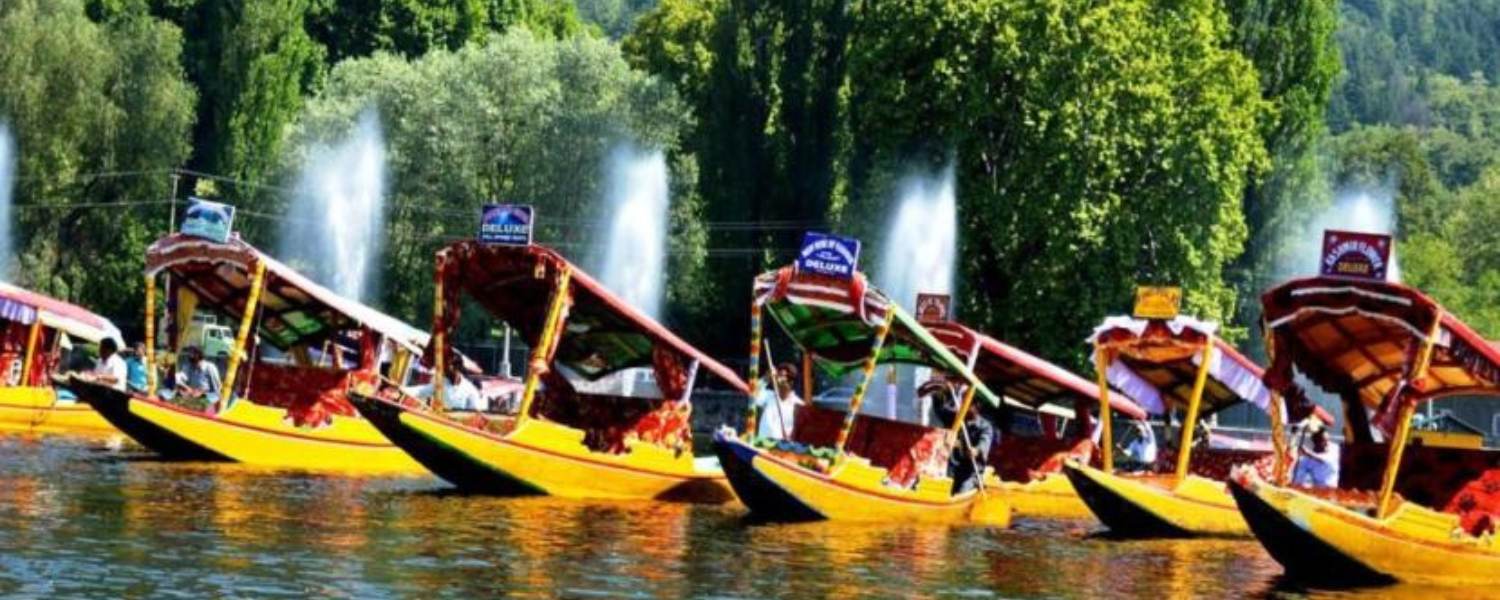
Festivals in Jammu & Kashmir, including the vibrant Shikara Festival, are set to grace the picturesque water bodies of Kashmir in March 2024.
During July and August, these serene waters come alive with the colorful spectacle of Shikaras, traditional boats emblematic of Kashmiri heritage.
Locals and tourists flock to witness the grandeur and grace of these ornate vessels, adorned with intricate designs and vibrant hues.
As a tourist, immerse yourself in the beauty of Kashmir as you glide along the shimmering waters aboard one of these Shikaras, taking in the breathtaking surroundings of snow-capped peaks, lush greenery, and charming houseboats.
The festival offers an opportunity to experience the region’s rich cultural traditions while indulging in its natural landscape’s tranquil beauty.
Take the chance to participate in this unforgettable Kashmiri culture and hospitality celebration.
7. Gurez Festival
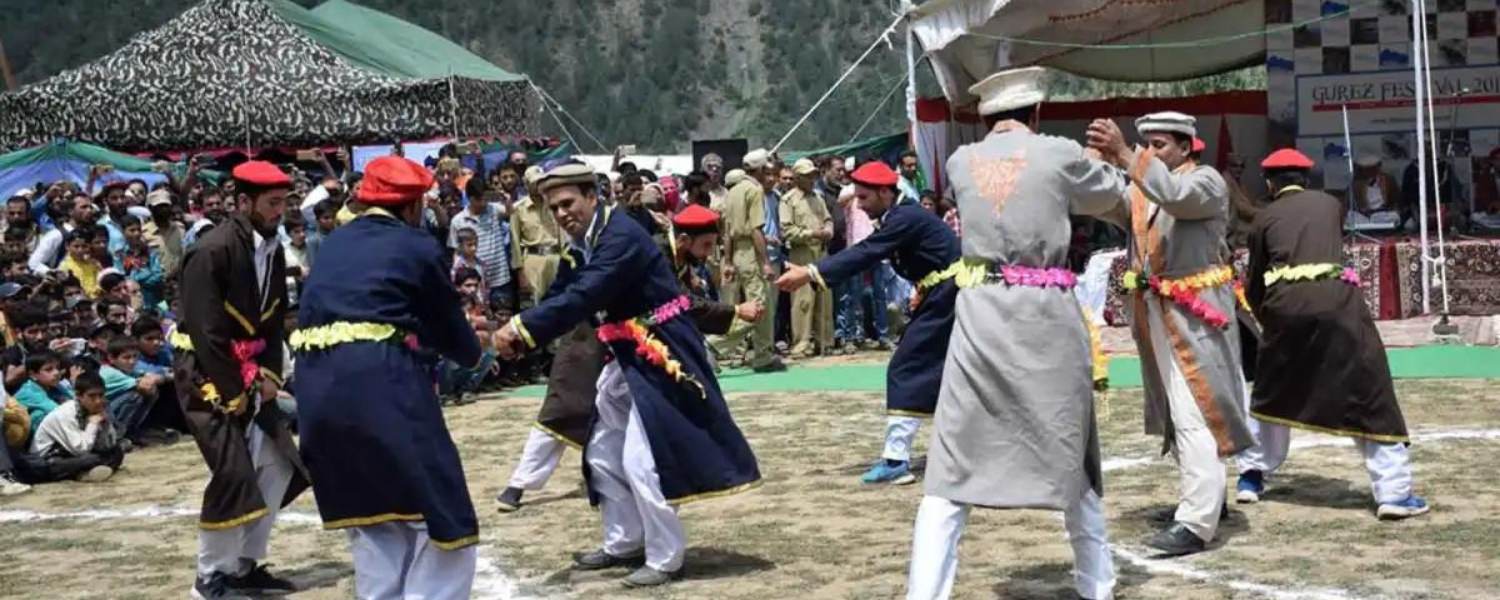
Festivals in Jammu & Kashmir, through the annual Gurez Festival, are typically held in July or August.
This eagerly anticipated event serves as a tribute to the rich heritage, traditions, and skilled artisans of the Gurez region.
Alongside captivating cultural displays, visitors can immerse themselves in exhilarating outdoor activities such as river rafting, trekking, and cycling, making it an ideal celebration for adventure enthusiasts and culture lovers.
The Gurez Festival provides a platform for local talents to shine, showcasing their craftsmanship through handcrafted items and traditional performances.
Against the breathtaking backdrop of the Himalayas, attendees can indulge in authentic cuisine, witness folk dances, and engage with artisans to learn about their time-honored techniques.
Whether you’re seeking cultural immersion or adrenaline-pumping escapades, the Gurez Festival offers a memorable experience that encapsulates the essence of festivals in Jammu & Kashmir.
Religious Festivals in India are vibrant celebrations that reflect the nation’s diverse cultural and spiritual heritage.
8. Lohri
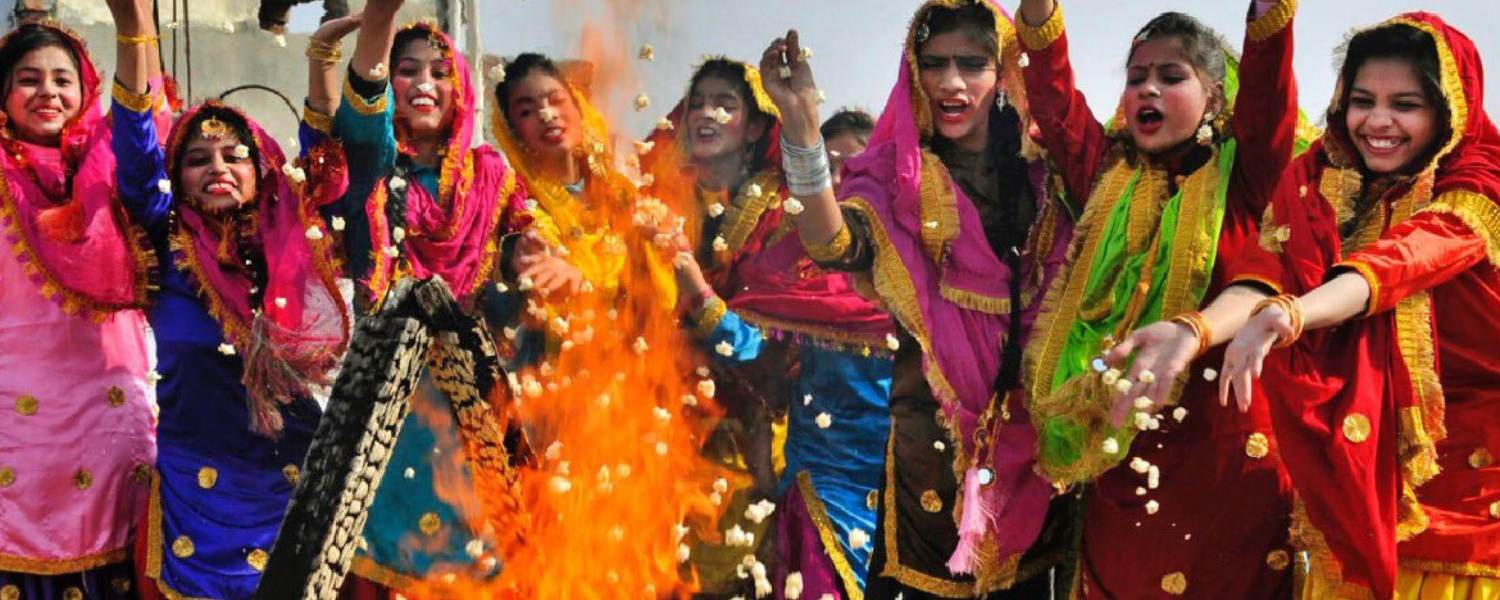
Lohri is celebrated on January 13th and holds a cherished place among the festivals in Jammu & Kashmir, particularly among the Dogra and Punjabi communities in Northern India.
This vibrant winter festival is steeped in cultural significance and folklore, drawing on ancient traditions and legends that resonate throughout the region.
Many believe that Lohri symbolizes the transition from winter to spring, marking the passing of the winter solstice.
As families and communities come together, bonfires are lit, and traditional songs and dances fill the air, creating an atmosphere of warmth and joy.
The festival also holds agricultural importance, celebrating the harvest season and offering prayers for a bountiful year ahead.
Lohri is not only a time for festivities but also a time for reflection, gratitude, and strengthening bonds within the community, making it a cherished tradition for generations.
9. Galdan Namchot
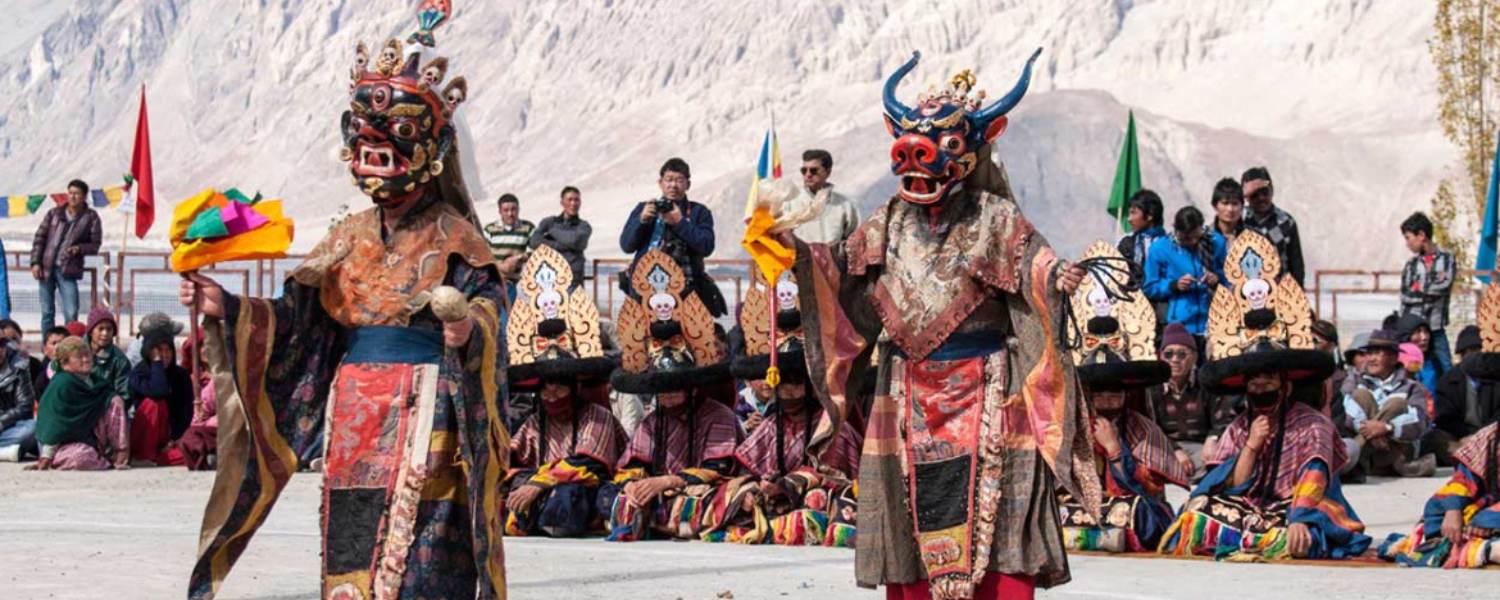
Galdan Namchot, celebrated on December 18th, holds a special place among the festivals in Jammu & Kashmir.
It commemorates the birth and enlightenment of Je Tsongkhapa, the revered founder of the Gelug school of Tibetan Buddhism.
This festival carries profound significance, as it literally and metaphorically symbolizes the triumph of light over darkness.
Throughout Ladakh, the festival is marked by vibrant celebrations and rituals.
Homes and monasteries are adorned with colorful decorations, and devotees gather to offer prayers and light butter lamps, symbolizing enlightenment and dispelling negativity.
Traditional dances, music, and cultural performances further enrich the festivities, fostering community and spiritual unity.
Galdan Namchot not only honors the legacy of Je Tsongkhapa but also serves as a reminder of the enduring spiritual heritage of the region.
It brings people together in joyous harmony, fostering a reverence and celebration that resonates deeply within the hearts of Ladakhis and visitors alike.
10. Losar
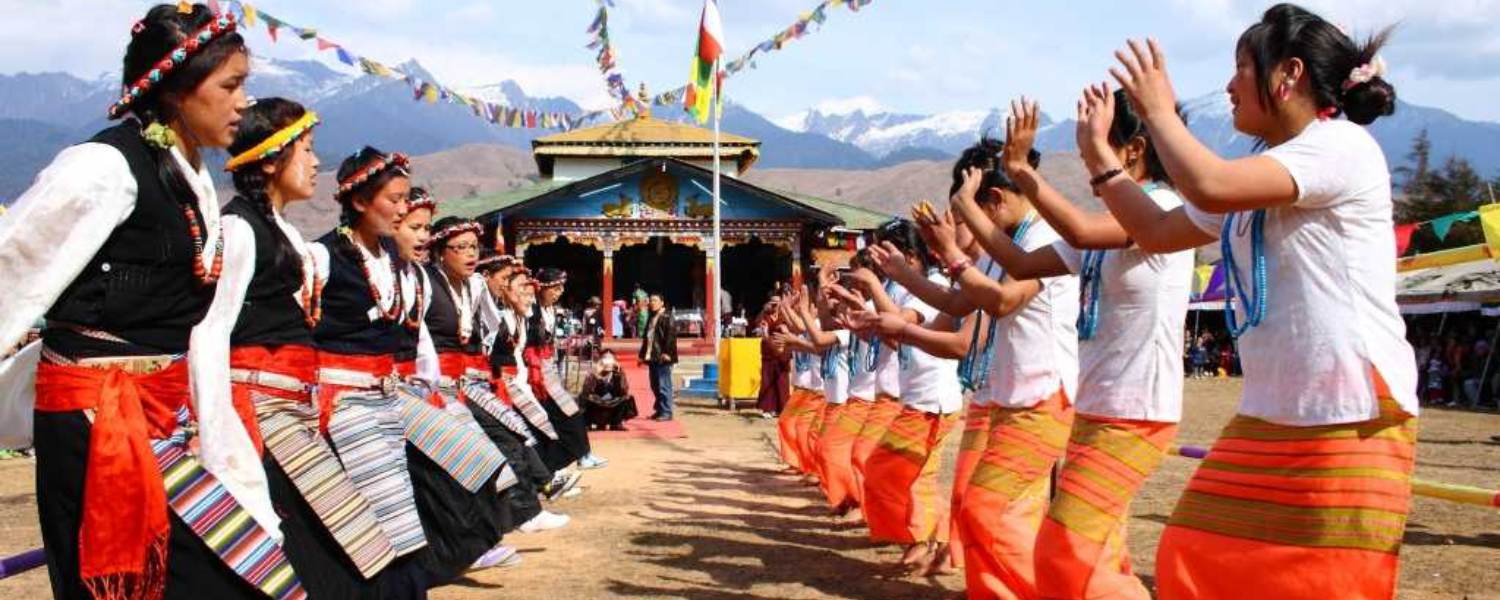
Losar, a significant Tibetan Buddhist festival, illuminates the serene landscapes of Ladakh from March 3rd to 5th, adding a splash of cultural vibrancy to the region.
This joyous occasion is a cornerstone of the rich tapestry of festivals in Jammu & Kashmir, marked by traditional songs, lively folk dances, and heartfelt prayers.
During Losar, the Ladakhi communities gather in jubilant gatherings, adorned in vibrant conventional attire, to partake in age-old rituals and celebrations.
Streets are decorated with colorful decorations, and the air is filled with the aroma of incense and the sounds of joyous chants.
Families unite to offer prayers for prosperity and good fortune in the upcoming year, while monks perform sacred ceremonies in monasteries, invoking blessings for the well-being of all.
Beyond its religious significance, Losar embodies the spirit of unity and cultural pride, showcasing the rich heritage of Ladakh.
It serves as a poignant reminder of the resilience and enduring traditions of the Tibetan Buddhist community in the region, inviting visitors to immerse themselves in the warmth and hospitality of Ladakhi culture during this auspicious festival.
11. Sindhu Darshan Festival
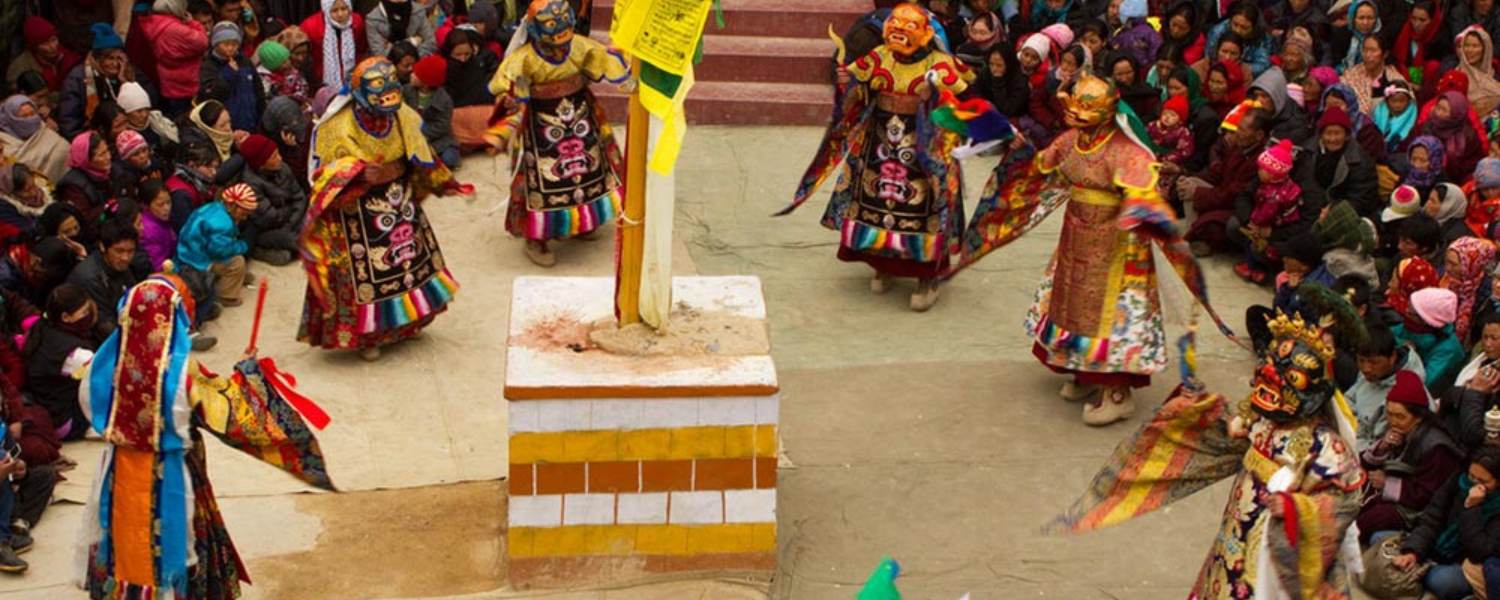
In Leh, Ladakh, India, the vibrant celebration of the Sindhu Darshan Festival is part of the array of festivals in Jammu & Kashmir.
This annual event, typically falling between June 12th and 14th, coincides with the auspicious full moon day of Guru Purnima.
Attracting devotees from far and wide, the festival’s focal point is the serene banks of the Indus River, locally known as the Sindhu River.
During this joyous occasion, devotees congregate to pay homage to the river, which holds profound cultural and spiritual significance in Indian heritage.
The festival pulsates with colorful rituals, cultural performances, and heartfelt prayers, creating an atmosphere of unity and reverence.
It serves as a poignant reminder of the region’s rich cultural tapestry and deep-rooted traditions.
The Sindhu Darshan Festival offers an opportunity for locals and tourists alike to see the spiritual essence of the land, fostering a sense of communal harmony and cultural pride.
Conclusion
In conclusion, the festivals in Jammu & Kashmir offer a vibrant tapestry of cultural richness and diversity, reflecting the region’s deep-rooted traditions and heritage.
These celebrations are poignant reminders of the unity and harmony among the diverse communities inhabiting this breathtaking land.
From the exuberant festivities of Baisakhi and Lohri to the spiritual hunger of Eid and the colorful revelry of Holi, each festival paints a vivid picture of communal harmony and mutual respect.
The unique blend of customs, rituals, music, and cuisine showcased during these events captivates both locals and visitors, fostering camaraderie and shared cultural pride.
Furthermore, these festivals catalyze economic growth and tourism, attracting travelers from afar to participate in the joyous celebrations.
Overall, the festivals in Jammu & Kashmir testify to the region’s rich cultural heritage and enduring spirit of inclusivity and unity.
FAQ
Q: What are the major festivals in Jammu & Kashmir?
Jammu & Kashmir, known for its rich cultural heritage, celebrates many festivals annually. Some prominent ones include Lohri, Baisakhi, Eid-ul-Fitr, Eid-ul-Adha, Navratri, Diwali, and Christmas.
Q: Are there any unique festivals specific to Jammu & Kashmir?
A: Yes, festivals in Jammu & Kashmir boast distinctive festivals such as Shivratri, Hemis Festival, and Baisakhi, which hold special significance in the region’s cultural tapestry. These festivals often blend religious rituals with vibrant cultural performances, creating unique experiences.
Q: When do these festivals usually take place?
A: The festival calendar in Jammu & Kashmir varies, aligning with different religious and cultural occasions. For instance, Eid-ul-Fitr and Eid-ul-Adha follow the Islamic lunar calendar, while Lohri and Baisakhi typically fall in January and April, respectively, following the solar calendar.
Q: Are these festivals open to tourists?
A: Absolutely! Many festivals in Jammu & Kashmir are open to tourists, offering them a glimpse into the region’s diverse traditions and customs. Visitors can immerse themselves in the festive fervor, partake in rituals, and relish local delicacies during these celebrations.
Q: Where can tourists find more information about festival schedules and activities?
A: Tourists can inquire with local tourism offices, check online portals, or consult travel guides for updated information on festival schedules, venues, and activities. Additionally, contacting local tour operators or accommodations can provide valuable insights into experiencing festivals firsthand in Jammu & Kashmir.
